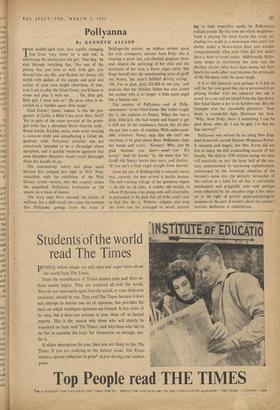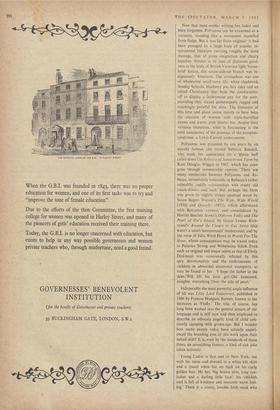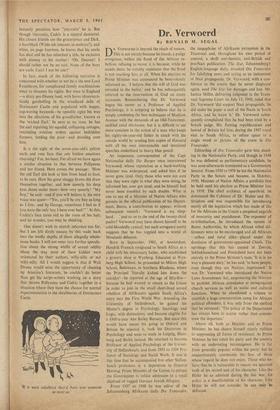Pollyanna
By KENNETH ALLSOP THE middle-aged man,. face rapidly changing hue from 'very white' to 'a dull red,' is addressing the eleven-year-old girl. 'One day,' he says through twitching lips, 'like one of the prisms that you love so well, little girl, you danced into my life, and flecked my dreary old world with dashes of the purple and gold and scarlet of your own bright cheeriness. If ever, ever I am to play the Glad Game, you'll have to come and play it with me. . . . Oh, little girl, little girl, I want you so!' He gives what is re- corded as a 'sudden queer little laugh.'
Glad Game? Queer, indeed. Is this the pro- genitor of Lolita, a Bible Class prize Baby Doll? Yet in spite of the cover portrait of the prism- girl (who has a shrunken Doris Day-ish look: flaxen braids, freckles, saucy snub nose) wearing a come-on smile and semaphoring a rather de- generate wink, Pollyanna certainly was not consciously intended to be a rib-nudger about nymphets, and it quickly becomes apparent that even Humbert Humbert would recoil distraught from this bundle of joy.
The concussively merry and pious small heroine first romped into sight in 1913. Now, coincident with the exhibition of the Walt Disney screen version, into this country comes the paperback Pollyanna, frolicsome as the spume on a wave of nausea.
The story may have warmed the hearts of millions, but a chill struck into mine the moment that Pollyanna springs from the train at Beldingsville station, an orphan wished upon her rich, crosspatch, spinster Aunt Polly. She is wearing a straw hat, red-checked gingham dress and, despite the quivering of her chin and the moistness of her eyes, a brave, eager smile. She flings herself into the unwelcoming arms of gruff old Nancy, her aunt's faithful skivvy, crying: 'Oh, I'm so glad, glad, GLAD to see you,' and explains that her minister father has now joined her mother who is no longer 'a little earth angel but a heaven one.'
The essence of Pollyanna—and of Polly- annishness—i§ her Glad Game. Her father taught her it, she explains to Nancy. When she was a little, little girl, she had hoped and hoped to get a doll out of the missionary barrel, but all that she got was a pair of crutches. With understand- able irritation, Nancy says that she can't see anything to be glad about there. Pollyanna claps her hands and crows: `Goosey! Why, just be glad because you don't—need—'em. It's lovely! And the harder 'tis, the more fun 'tis. Gruff old Nancy bursts into tears, and chokes: 'If you ain't a little angel straight from heaven.'
Soon the rest of Beldingsville is uneasily aware that, anyway. the new arrival is hardly human. The full roasting voltage of her goodness begins to be felt on all sides. A crabby old invalid, to whom Pollyanna trips along with calf's-foot jelly, is persuaded to be glad that all folks aren't sick in bed like she is.. Widows, cripples and even the town tart are assuaged or saved, accord- ing to their respective needs; by Pollyanna's radiant prattle. By this time the whole neighbour- hood is playing the Glad Game like crazy, in- cluding two waifs in a snowstorm who crawl for shelter under a blown-down door and wonder compassionately what poor folks did that didn't have a door to crawl under. Additionally, Polly- anna unites in matrimony her aunt and the desolate doctor (who have been eating out their hearts for each other) and becomes the prism-girl of the life-hater with the queer laugh.
It is at this juncture (and perhaps it is just as well for her own good that she is prevented from playing further with her admirer) that she is struck by a car and paralysed from the hips down. Her Glad Game is put to its harshest test. But she triumphs over her reasonable glumness : 'Sud- denly a wonderful light illumined her face. "Why, Aunt Polly, there is something I can be glad about, after all. I can be glad I've had my legs anyway!"' Pollyanna was written by an ailing New Eng- land housewife named Eleanor Hodgman Porter. It instantly sold hugely, but Mrs. Porter did not live to enjoy the full avalanching success of her homily. She died in 1920 without seeing the sales roll massively on into the latter half of the cen- tury, undiminished by increasing sophistication, undamaged by the American adoption of the heroine's name into the derisory vernacular of the cynical as a label for all that is corrosively sentimental and priggishly cute—and perhaps even enhanced by the macabre tinge it has taken on in the light of greater quasi-psychological nosiness on the part of readers about the author's motives, deliberate or undeliberate. Now that most similar writing has faded and been forgotten, Pollyanna can be examined as a curiosity, standing like a monument modelled from fudge. But it was far from original: it had been presaged by a large body of popular in- spirational literature carrying roughly the same message, that of pious resignation and cheery humility. Similar in its tone of glutinous good- ness to the body of British Victorian light 'house- hold' fiction, this sunny-side-up branch was in- digenously American. The atmosphere was one of wholesome small-town life, white clapboard, Sunday Schools, blueberry pie, hay rides and an edited Christianity that bade the comfortably- off to display a lachrymose pity for the poor, providing they stayed picturesquely ragged and touchingly grateful for alms. The literature of this time and place seems mainly to have been the creation of women with triple-barrelled names and warm, pink hearts; but, despite their virtuous intentions, what is fascinating is the eerie consistency of the presence of the nymphet- syndrome, a Lewis Carroll undercurrent.
Pollyanna was preceded by ten years by an equally famous chit named Rebecca Randall, who made her appearance (in a 'glossy buff calico dress') in Rebecca of Sunnvhrook Farm by Kate Douglas Wiggin in 1903. which has since gone through innumerable reprints. There are many similarities between Pollyanna and Re- becca, immediately noticeable in Rebecca's rather unhealthy cuddly relationships with crusty old coach-drivers and such. But perhaps the form was given its slightly creepy spiritual mood 'by Susan Bogert Warner's The Wide, Wide World (1850) and Qtteechy (1852), which effervesced with Bostonian coyness, and consolidated by Harriet Beecher Stowe's Olthown Folks and The Pearl of Ores Island, by Grace Louise Rich- mond's Around the Corner in Gay Street (this wasn't a smart homosexuals' rendezvous), and by the verse of Julia Ward Howe in Words For The Hour, whose consequences may be traced today to Patience Strong and Wilhelmina Stitch. Even such an original and major talent as that of Emily Dickinson was occasionalls, infected by this spry devotionalism and the enshrinement of children in abnormal emotional transports, as may be found in her : '1 hope the father in the skies/Will lift his little girl /Old fashioned, naughty, everything/Over the stile of pearl.'
Indisputably the most powerful single influence of all was Little Lord Fauntleroy, published in 1886 by Frances Hodgson Burnett, known to her intimates as 'Fluffy.' The title, of course, has long been washed into the general stream of our language and is still now and then employed to describe an odiously angelic kind of child con- stantly camping with grown-ups. But I wonder how many people today have actually experi- enced the branding iron of this work upon their naked skin? It is, even by the standards of those times, an astonishing fantasy, a kind of sick joke taken seriously.
Young Cedric is first met in New York, out with his nurse and dressed in a white kilt skirt and a round white hat set back on his curly golden hair. He has 'big brown eyes, long eye- lashes and a darling little face'; his 'childish soul is full of kindness and innocent warm feel- ing.' There is a comic, lovable Irish maid who
instantly perceives how "risycratic' he is. But though 'risycratic, Cedric is a natural democrat. His closest friends are the groceryman and Dick, a bootblack (Wilde-ish interests in embryo?), and when, on page fourteen, he'learns that his uncle has died and he has inherited a title, he exclaims with dismay to his mother: 'Oh, Dearest! I should rather not be an earl. None of the boys are earls. Can't I not be one?'
In fact, much of the following narrative is concerned with whether or not he is the new Lord Fauntleroy, for complicated family machinations enter to threaten his rights. But once in England —a dizzy pre-Disney land, with hares idiosyncra- tically gambolling in the woodland dells of Dorincourt Castle and populated with happy, cap-waving hayseeds—he speedily ogles his way into the affections of his grandfather, known as the 'wicked Earl.' In next to no time, he has the earl repairing his squalid, collapsing cottages, rescinding eviction orders against bedridden farmers, feeding the poor—and drooling over him.
Is it the sight of the seven-year-old's yellow curls and rosy face that sets hidden emotions churning? For, ho-hum, I'm afraid we have again a similar situation to that between Pollyanna and her friend. Here comes the passage: 'How the old Earl did look at him from head to foot, to be sure. How his great shaggy brows did draw themselves together, and how queerly his deep eyes shone under them—how very queerly! "My boy," he said—and if you will believe it, his very voice was queer—"Yes, you'll be my boy as long as I live: and by George, sometimes I feel as if you were the only boy I have ever had!" ' At this, Cedric's face turns red to the roots of his hair, and no wonder, you may be thinking.
One doesn't wish to stretch inference too far, but I am left direly uneasy by this wade back into the weedy depths of these allegedly whole- some books. I will not enter into further specula- tion about the strong whiffs of sexual oddity about the way most of these kiddies were orientated by their authors, willy-nilly or not willy-nilly. All I would suggest is that if Walt Disney would seize the opportunity of cleaning up America's literature, he couldn't do better than get his script-writers working on a story that throws Pollyanna and Cedric together in a situation where they have the chance for normal experimentation in the shrubberies of Dorincourt Castle.
'If it were inhabited they'd have sent someone to meet us.'








































 Previous page
Previous page